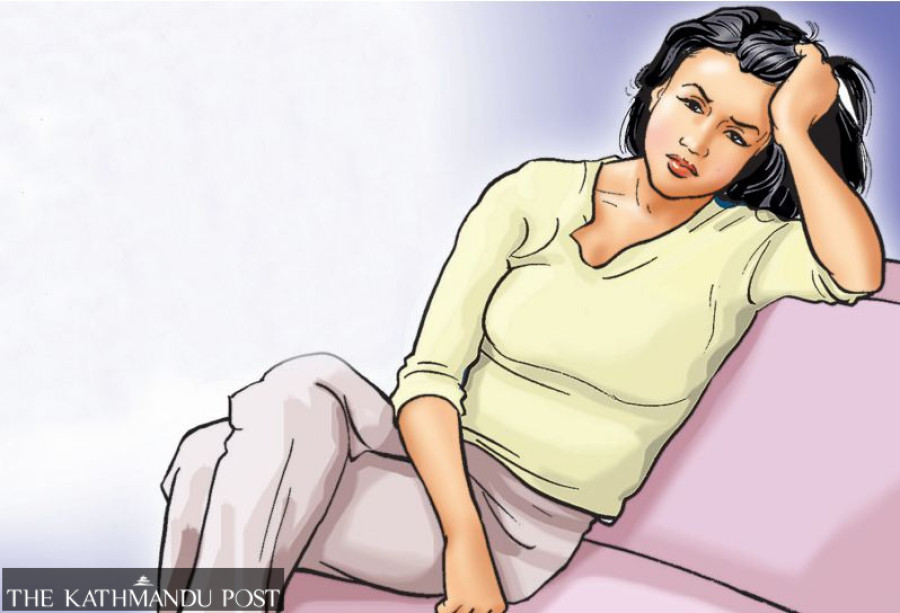National
Young unmarried girls often face prejudice and negligence at the gynaecologists’
Experiences show many doctors offend young patients by asking questions disregarding their privacy and agency.
Aakriti Ghimire
When she walked down the halls of a renowned hospital in Kathmandu, holding her mother’s arms tightly, she was 15. As she sat in the waiting area for her ultrasound sonography (USG) test, she felt judged, scared and intimidated.
“I can still feel how everyone was just staring at me back then. The waiting area was filled with pregnant women and their partners,” recalls Akriti Shrestha, who is now 24 and a fifth-year MBBS student at Kathmandu Medical College, Sinamangal. “I guess they all assumed that I was pregnant too.”
Shrestha wasn’t pregnant. She hadn’t menstruated for four months. That led her to visiting the gynaecologist.
However, as an adolescent, her visit was unpleasant.
“The doctor was so rude,” said Shrestha. “She looked at us from head to toe with a smirk on her face. ‘So, you are already married?’ she said, curtly, assuming that I was. ‘You have a husband?’ she asked, even though I was with my mother. I wished I didn’t have to visit a gynaecologist ever again.”
Women and young girls say they have faced and still continue to face such experiences at the gynaecologists’ because of the doctors’ approach to dealing with them.
Medical experts admit that many doctors lack the tact and sensitivity required in dealing with adolescent girls. Such experiences highlight the lack of adolescent-friendly gynaecology services for young girls, according to them.
“Doctors are taught to deal with gynaecology through an adult perspective,” said Anjana Karki, a gynaecologist at B&B Hospital. “And many a time they treat young girls with less sensitivity. Their privacy isn’t respected, and when we judge them, it becomes intimidating for young ones.”
Gynaecologists are experts of a wide range of women’s health issues, including menstruation and fertility issues, sexually transmitted infections (STIs), contraception, and hormone disorders.
A majority of gynaecologists, however, aren’t trained to deal with adolescents, and there are no adolescent-friendly health clinics, according to Karki.
Under the Ministry of Health and Population, Adolescent and Sexual Reproductive Health Programme (ASRH) was included in Nepal’s National Reproductive Health Strategy in 1998.
ASRH aimed to establish 1,000 adolescent-friendly health facilities by 2015. The government’s website claims that as of 2016, 1,534 health facilities were already adolescent-friendly.
However, the service remains inadequate and inaccessible to adolescents.
Dealing with adolescents and their health requires a lot of tact and sensitivity, lack of which leads to incorrect reporting of medical and sexual history, misdiagnosis and horrible experiences with doctors for young girls, according to Karki.
Many young girls say they have either been dismissed for their pain, asked not to think about it or have been scrutinised morally by medical professionals.
When Aasna Sijapati, 22, was in her adolescent years, her menstrual cycles were followed by excruciating pain. On consulting a gynaecologist, her pain was dismissed and invalidated.
“I have incredibly horrible period cramps, to the point where I take about three-four painkillers during my periods. When I was 13, the doctor literally said ‘how about you not think about it, and instead distract yourself’,” said Sijapati, assistant instructor at the Office of Social Responsibility, New York University Abu Dhabi.
When Sijapati sought a different gynaecologist about four years later, she encountered a similar problem.
Her new doctor treated her better but failed to counsel her on the condition itself—on what the disease is and how it impacts her body. The gynaecologist instead said that they would look into her condition only after she gets married.
“The doctor would say ‘take these medicines for now; once you get married and do family planning, we can deal with it’. So all my pain, inconvenience, and how it affects my lifestyle before marriage is all just invalid and not a matter of concern,” Sijapati said. “That is so messed up.”
Sijapati emphasises that both her experiences were at expensive private hospitals in Kathmandu with “well-known” gynaecologists who have years of experience.
Not only is adolescent girls’ health not prioritised unless it is for reproductive roles, they are also exposed to judgements and comments. In addition, they also express the feeling of a violation of their privacy and confidentiality. Many aren’t counselled adequately either.
About a year ago, a 16-year-old girl was asked if she had a boyfriend in front of her parents by a gynaecologist when she went for a breast examination. She says that the doctor did not respect her privacy by posing the question in front of her mother.
Instead of inquiring about their sexual activity in a private, confidential and respectful manner, gynaecologists often ask questions such as ‘are you married,’ ‘where is your husband,’ ‘do you have a boyfriend,’ and ‘are you a virgin’ in front of their guardians, violating the young girls’ privacy.
Oftentimes, the questions are blurted in a brusque and impatient manner, making young adolescents feel offended and intimidated.
According to medical experts, patients have a right to privacy, confidentiality and a right to refuse treatment. Medical ethics require doctors to uphold the patients’ rights while counselling them, says Karki.
“A young girl can confide in her doctor and share her medical history. That information should not be shared even with her parents if she doesn’t wish to. Both her privacy and confidentiality should be maintained,” says Karki, who is also a member of Nepal Society Of Obstetricians and Gynaecologists (NESOG).
However, adolescents aren’t much aware of their rights. Their dependency on their parents for financial needs and signatures often makes them vulnerable to being mistreated, according to Karki.
Such negligence, by asking intrusive questions in front of parents, is likely to cause misdiagnosis. Young girls are hesitant to share their sexual history in front of their parents, which provides inaccurate medical history.
“As a doctor, interacting with young girls requires a lot of tact. I usually ask the mother to leave before I ask questions about their sexual history. Adolescents are often dishonest about their medical history in the presence of their guardians, which leads to misdiagnosis,” says Karki. “Sometimes misdiagnosis has led to girls coming in three-four months pregnant, and sometimes even to deliver a child.”
Realising the need for adolescent-friendly health clinics, NESOG had established an adolescent health clinic inside Bir Hospital in the early 2000s. However, the clinic wasn’t prioritised by policymakers, and was later discontinued, says Karki.
Access to adequate and judgement-free health care for adolescent girls is a cause for concern. Doctors’ prejudices have kept many from receiving respectful, timely and adequate medical attention and treatment.
As a medical student herself, Shrestha understands the hectic lives of medical professionals. However, she feels that a doctor has greater responsibility in ensuring the patient is treated respectfully.
“I understand that the life of a doctor is hectic,” says Shrestha. “However, treating a patient isn’t just about performing surgical operations. It is also about how you deliver your services to the patients who come trusting you.”




 9.89°C Kathmandu
9.89°C Kathmandu














